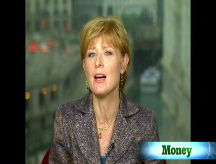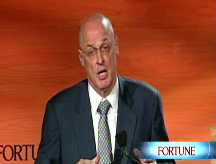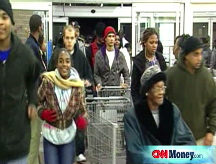Dow plunges 680 points
Stocks slump as U.S. recession is officially called and signs point to a prolonged slowdown.

NEW YORK (CNNMoney.com) -- Stocks got hammered Monday, as investors bailed out following confirmation that the U.S. is mired in a recession and indications that it's likely to continue for some time.
The Dow Jones industrial average (INDU) lost 680 points, its fourth-biggest single-session decline on a point basis ever. The decline was 7.7% in percentage terms - the 12th worst percentage one-day decline ever.
Year-to-date, the Dow is down 38.6% and has lost 42.5% from its record close of 14164.53 hit on Oct. 9, 2007.
The Standard & Poor's 500 (SPX) index fell 8.9% and the Nasdaq composite (COMP) gave up 9%.
Treasury prices rallied, lowering the corresponding yields. Oil and gold prices plunged. The dollar tumbled versus the yen and gained against the euro.
Stocks slid throughout the morning as investors sorted through Black Friday sales reports and weak readings on manufacturing in the United States and abroad.
But the selling accelerated in the afternoon after the National Bureau of Economic Research (NBER) confirmed what many have long believed - that the nation is in a recession. According to the NBER, the official body that calls economic cycles, the U.S. has been in a recession since December 2007.
"The economy stinks, the manufacturing report didn't come out well, and the announcement from the NBER didn't help," said Ram Kolluri, president at Global Investment Management.
"There's a real nervousness about the economy," he added.
The market was already primed for a selloff after last week's run, analysts said. After hitting multi-year lows a little over a week ago, the S&P 500 rallied 19% through last Friday, while the Dow and Nasdaq both gained just under 17%.
"We're going to continue to see this extreme volatility because there's no clear end in sight to all the crises," said Dean Barber, president at Barber Financial Group.
Speaking in the afternoon, Federal Reserve Chairman Ben Bernanke said that the economic weakness will continue for some time, despite the impact of the government's efforts to get money flowing again.
Treasury Secretary Henry Paulson, speaking at a Fortune 500 forum in the afternoon, said the downturn was significant. He also said that the federal government is looking to expand the financial rescue program.
Last week's gains followed the announcement of President-elect Barack Obama's economic team and Citigroup's bailout. Positive reports on Black Friday also helped stocks at the end of last week. But market experts expect the critical holiday-shopping period to be tepid.
Economy: The Institute for Supply Management said its November manufacturing index fell to a 26-year low of 36.2 from 38.9 in October. That was worse than what economists were expecting, according to a survey from Briefing.com.
October construction spending fell 1.2% versus a flat reading in the previous month. Economists thought spending would drop 1%.
Global economic news was pretty grim as well, with manufacturing surveys in Britain and the euro zone showing a steep slowdown. A reading on China's manufacturing survey was equally worrisome.
Asian markets ended in mixed territory and European markets ended lower.
Retail sales: Shoppers came out in droves over the weekend, motivated by pent-up demand and deep discounts, but the surge is not expected to last.
Including "Black Friday," the day after Thanksgiving, shoppers spent $41 billion in the four-day holiday weekend, according to the National Retail Federation (NRF), an industry trade group. The average shopper spent $372.57, up 7.2% from a year ago.
However, overall 2008 holiday spending is expected to rise just 2.2% from a year ago, the smallest gain in six years.
Thursday's November retail sales reports from the nation's chain stores will be critical, as they include the four-day holiday weekend, said Dave Rovelli, managing director of U.S. equity trading at Canaccord Adams.
"If they don't report a lift up in same-store sales, even with Black Friday included, that's going to be a big negative for the (stock) market," Rovelli said.
Same-store sales is an industry metric that refers to sales at stores open a year or more.
Early reports suggest "Cyber Monday" online shopping sales are on track to be flat or slightly higher versus a year ago.
Consumer spending drives two-thirds of economic growth, and the pullback has exacerbated the economic slowdown.
Obama: The president-elect announced his national security team. As expected, Sen. Hillary Clinton, D-N.Y., was nominated Secretary of State and current Defense Secretary Robert Gates was asked to stay on. Retired Marine Gen. James Jones was nominated as national security adviser, Eric Holder was picked for Attorney General and Arizona Gov. Janet Napolitano was the choice for Secretary of Homeland Security. (Full story)
Automakers: GM (GM, Fortune 500) and Ford (F, Fortune 500) gained last week on growing bets that they, along with Chrysler, will receive a government bailout. But the stocks tumbled Monday in tune with the broader market.
The auto industry's first pitch to Congress was rebuffed, but there is increased speculation that its second pitch will be more successful.
The companies have until Tuesday to submit proposals for how they would use $25 billion in taxpayer money to make their companies "viable." The Senate Banking Committee is scheduled to host a hearing Thursday, while the House Financial Services Committee is holding a hearing Friday.
Other movers: JPMorgan Chase, which bought collapsed bank Washington Mutual earlier this fall, said it will cut 9,200 WaMu jobs, or around 20% of the company's workforce. JPMorgan (JPM, Fortune 500) shares fell 17.8%.
Johnson & Johnson (JNJ, Fortune 500) said it will buy breast implant maker Mentor (MNT) for $1.07 billion, or $31 a share, nearly double the company's closing price from Friday. Dow stock J&J fell 5.6%, while Mentor gained 89%.
Stock declines were broad based, with all 30 Dow components falling, led by financial components American Express (AXP, Fortune 500), Citigroup (C, Fortune 500) and Bank of America (BAC, Fortune 500).
Other financial stocks tumbled too. Goldman Sachs (GS, Fortune 500) lost almost 17% after analysts said the company is likely to post a bigger quarterly loss in the fourth quarter than previously thought.
All but two of the S&P 500 stocks ended lower. The two gainers were Rohm and Hass (ROH, Fortune 500) and AutoNation (AN, Fortune 500).
Market breadth was negative. On the New York Stock Exchange, losers beat winners by 7 to 1 on volume of 1.6 billion shares. On the Nasdaq, decliners topped advancers by five to one on volume of 1.99 billion shares.
Other markets: The dollar gained versus the euro but fell against the yen.
U.S. light crude oil for January delivery fell $5.15 to settle at $49.28 a barrel on the New York Mercantile Exchange.
COMEX gold for February delivery fell $42.20 to settle at $776.80 an ounce.
Gasoline prices continued the fall to nearly four-year lows, with prices down half a cent to a national average of $1.82 a gallon, according to a survey of credit-card swipes released Monday by motorist group AAA. Prices have been sliding for more than two months, losing over $2 a gallon or 53%.
Bonds: Treasury prices rallied, lowering the yield on the benchmark 10-year note to 2.72% from 2.92% Friday. Last month, the 2-year, 10-year and 30-year government bonds all hit their lowest levels since the Federal Reserve started keeping records in 1962.
The yield on the 3-month Treasury bill improved to 0.03% from 0.02% Friday, but still not far from 68-year lows of zero hit last month. The 3-month is seen as the safest place to put money in the short term. A low yield means wary investors would rather preserve cash despite earning little or no interest on it than risk the stock market.
Lending rates were mixed. The 3-month Libor rate held steady at 2.22%, unchanged from Friday, while overnight Libor fell to 1.09% from 1.16% Friday, according to Bloomberg. Libor is a key bank lending rate. ![]()





